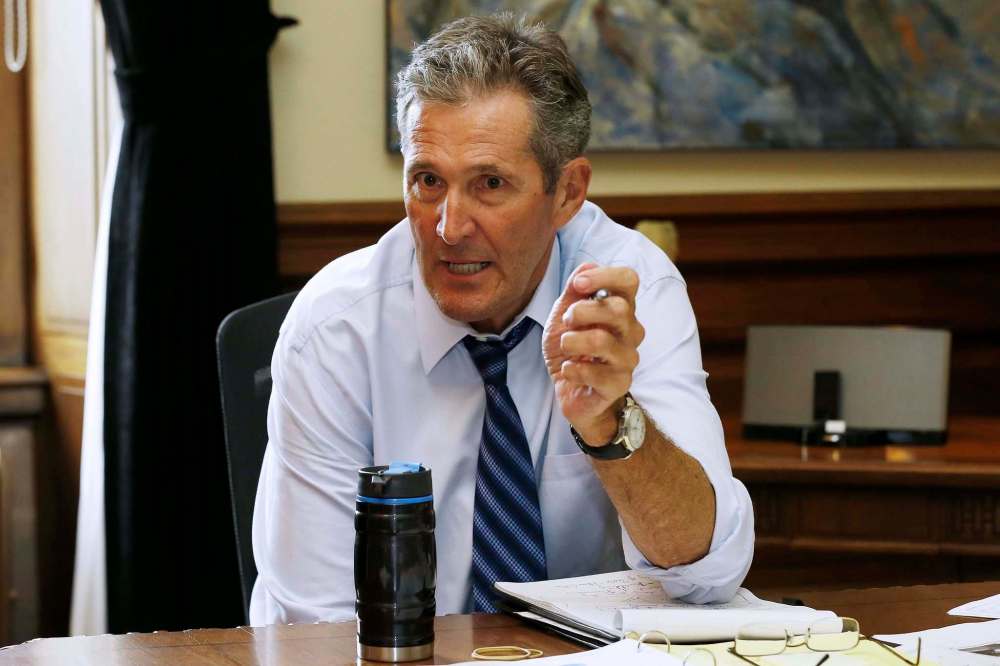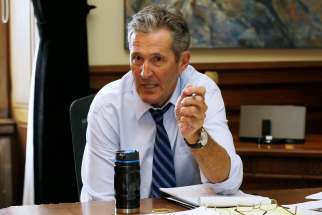Pallister’s persistence pushes court gamble forward
Read this article for free:
or
Already have an account? Log in here »
To continue reading, please subscribe:
Monthly Digital Subscription
$0 for the first 4 weeks*
- Enjoy unlimited reading on winnipegfreepress.com
- Read the E-Edition, our digital replica newspaper
- Access News Break, our award-winning app
- Play interactive puzzles
*No charge for 4 weeks then price increases to the regular rate of $19.00 plus GST every four weeks. Offer available to new and qualified returning subscribers only. Cancel any time.
Monthly Digital Subscription
$4.75/week*
- Enjoy unlimited reading on winnipegfreepress.com
- Read the E-Edition, our digital replica newspaper
- Access News Break, our award-winning app
- Play interactive puzzles
*Billed as $19 plus GST every four weeks. Cancel any time.
To continue reading, please subscribe:
Add Free Press access to your Brandon Sun subscription for only an additional
$1 for the first 4 weeks*
*Your next subscription payment will increase by $1.00 and you will be charged $16.99 plus GST for four weeks. After four weeks, your payment will increase to $23.99 plus GST every four weeks.
Read unlimited articles for free today:
or
Already have an account? Log in here »
Hey there, time traveller!
This article was published 05/07/2019 (2349 days ago), so information in it may no longer be current.
If nothing else, one must certainly admire Brian Pallister’s resolve.
The premier of Manitoba has demonstrated numerous times since being sworn into office in 2016 that he’s not the sort to easily let loose of an idea, a promise, a crusade or a grudge — even, at times, when the available evidence suggests the more practical and economical approach would be to retreat and reconsider.
The latest example of Mr. Pallister’s dedication to doggedness came this week in the form of his declaration that Manitoba’s lawsuit against the federal government over its imposition of a carbon tax will continue in Federal Court.
This determined posture persists despite Saskatchewan and Ontario both having lost carbon tax-related lawsuits in their respective courts of appeal. New Brunswick had also planned a challenge, but Premier Blaine Higgs now says he might abandon it while maintaining New Brunswick’s standing as an intervener as Saskatchewan appeals its case to the Supreme Court.

“We believe we have a compelling case to make,” Mr. Pallister said this week in reference to the decision to push ahead with the suit. Manitoba filed its constitutional question in Federal Court on April 24. Last week, a federal judge set out timelines for the case; because of the upcoming provincial and federal elections, the two sides won’t meet to set a hearing date until early next year.
On the issue of Manitoba’s case being sufficiently different from the unsuccessful challenges mounted by its provincial neighbours, Mr. Pallister must prove his point. He says that in addition to challenging the legality of a federally imposed carbon tax — which was deemed constitutional by majority rulings in both Saskatchewan and Ontario — Manitoba’s suit also claims the fuel charge imposed in the province by the Trudeau government is unfair because it is higher than in other jurisdictions. The premier has yet to back up this assertion with scientific or economic evidence.
The Manitoba argument states the federal government did not adequately consider the flat-rate carbon tax which was included in Manitoba’s green plan. Given that Mr. Pallister later inexplicably cancelled that flat-rate tax, this argument seems stale-dated. The premier does, however, rightly assert that the federal carbon plan does not give Manitoba credit for its abundance of environmentally friendly hydroelectricity.
Whether all this amounts to better odds that Manitoba can successfully confront the federal government where other provinces have failed remains to be seen — and won’t be seen until after voters in this province have decided whether to give Mr. Pallister a second mandate that would necessarily include pursuing this court action to some logical conclusion or other.The carbon tax won’t be more than an ancillary issue in the provincial election conversation, but Mr. Pallister might still be forced to defend his Federal Court fight.
Those in the election-handicapping business have installed Mr. Pallister as a prohibitive favourite to return as premier, but the campaign that will begin in earnest next month will require him to answer difficult questions about several sticky issues, including health-care reform, Crown corporation governance and the opioid crisis.
The carbon tax won’t be more than an ancillary issue in the provincial election conversation, but Mr. Pallister might still be forced to defend his Federal Court fight — in a national poll released in May, roughly half the Prairie dwellers surveyed opposed provincial governments spending taxpayer dollars to challenge the federal carbon tax.
More than anything else, Mr. Pallister has tried to make his first term about fiscal responsibility, protecting taxpayers’ dollars and putting more money back on Manitobans’ figurative kitchen tables. In that context, continuing to spend on a court challenge that has been a losing bet in other provinces might be a bit of a tough sell.











